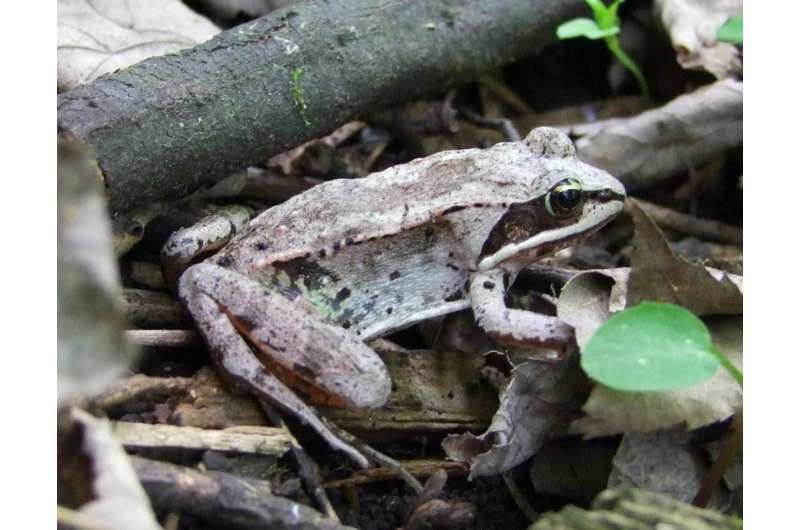
Although there is a large body of research on pests evolving tolerances for the pesticides meant to destroy them, there have been considerably fewer studies on how non-target animals in these ecosystems may do the same.
In research recently published, Rensselaer Polytechnic Institute’s Rick Relyea, Ph.D., professor of biological sciences and David M. Darrin ’40 Senior Endowed Chair, and his team have begun to address this gap in research. The findings are published in the journal Aquatic Toxicology.
“Because of economic interests, most pesticide research has focused on targeted pests, but we haven’t paid much attention to the non-target species, which represent all the other biodiversity in the world,” said Relyea.
“We also examined whether tolerance to pesticides could be rapidly induced in a non-target animal, which is something no one’s been looking at because that’s not the standard way to do toxicology tests.”
The standard toxicology tests focus on determining the lethal amount of pesticide in one exposure. Relyea and team, on the other hand, first exposed wood frogs to sublethal doses which, in many cases, allowed them to rapidly develop a higher tolerance within a few days.
“In nature, this is the way that animals are likely exposed,” said Relyea. “Animals living near agriculture, lawns, and landscaping, etcetera… are likely getting lots of small doses of pesticides. The question is, what does that do to the animals? Our research found that for several commonly used insecticides, wood frogs can increase their tolerance within days.”
Relyea and team examined the tolerance of 15 populations of wood frogs from western Pennsylvania and eastern New York to three common insecticides: carbaryl, chlorpyrifos, and diazinon. They compared results when the frogs were first exposed to no pesticide or sublethal concentrations before being exposed to lethal concentrations. The team discovered that nearly half of the populations exhibited rapidly inducible tolerance.
“We think this is a way that animals can more rapidly evolve tolerance to pesticides over many generations,” said Relyea. “If tolerance to a pesticide is first induced by a sublethal exposure, it helps protect the population over generations because that tolerance would be favored genetically. Later generations would not need to be exposed to sublethal doses in order to exhibit increased tolerance.”
It is important to point out that the increased tolerance is limited, however. “We don’t want people to think that pesticides pose no threat to non-target animals,” said Jessica Hua, Ph.D., associate professor in the Department of Forest and Wildlife Ecology at the University of Wisconsin-Madison.
“They can still die. There is a difference between being more tolerant and being impervious to pesticides. Additionally, this work builds on our research demonstrating that while low levels of pesticides can induce tolerance, this pesticide tolerance can be costly and affect the ability of animals to tolerate other threats, like diseases.”
Overall, the research is the first piece of a, hopefully, much larger puzzle.
“We hope our research opens the door for further studies,” said Jason Hoverman, Ph.D., professor of vertebrate ecology in the Department of Forestry and Natural Resources at Purdue University. “Can pesticide tolerance be induced in other amphibians? Can it be induced in other animals? Can tolerance be induced by other pesticides?”
“With this research, Dr. Relyea and his team have given us valuable insights on how amphibian species can rapidly adapt to a threat in their environment and, ultimately, pass that adaptation down through generations,” said Curt Breneman, Ph.D., dean of Rensselaer’s School of Science. “I look forward to seeing future results from this research while we also seek ways to reduce the presence of environmental toxins.”
In addition to Hua and Hoverman, Relyea was joined in research by Devin K. Jones, a postdoctoral researcher at Purdue University; Devin G. DiGiacopo at Binghamton University; and Rensselaer technicians Brian Mattes and Erika Yates.
More information:
Devin K. Jones et al, Naïve and induced tolerance of 15 amphibian populations to three commonly applied insecticides, Aquatic Toxicology (2024). DOI: 10.1016/j.aquatox.2024.106945
Citation:
Study shows frogs can quickly increase their tolerance to pesticides (2024, July 16)
retrieved 17 July 2024
from https://phys.org/news/2024-07-frogs-quickly-tolerance-pesticides.html
This document is subject to copyright. Apart from any fair dealing for the purpose of private study or research, no
part may be reproduced without the written permission. The content is provided for information purposes only.







